9 Best Time Management Techniques: Boost Productivity and Achieve More in 2023
In today’s fast-paced world, where demands and distractions abound, mastering the art of time management has become crucial for achieving success and maintaining a healthy work-life balance.
Time management refers to the process of organizing and planning your time effectively to maximize productivity, accomplish tasks efficiently, and achieve your goals.
Implementing effective time management techniques can have numerous benefits for individuals seeking to enhance their productivity and achieve more.
When it comes to effective time management, employing specific strategies can make a significant difference in your ability to accomplish tasks efficiently and achieve your goals.
Consider using techniques like the Eisenhower Matrix, where tasks are categorized as urgent, important, neither, or both.
I. Introduction to Time Management Techniques
In today’s fast-paced world, where demands and distractions abound, mastering the art of time management has become crucial for achieving success and maintaining a healthy work-life balance. Have you ever felt overwhelmed by the countless tasks on your to-do list, struggling to find enough hours in the day to accomplish them all? If so, you’re not alone. Time management is a skill that many people strive to develop, and fortunately, there are proven techniques that can help you boost your productivity and achieve more. By implementing effective time management techniques, you can boost productivity and achieve more in your personal and professional endeavors.
A. Definition of Time Management
Time management refers to the process of organizing and planning your time effectively to maximize productivity, accomplish tasks efficiently, and achieve your goals. It involves prioritizing activities, setting clear objectives, and allocating the right amount of time to each task or project. Effective time management enables you to work smarter, not harder, by focusing on the most important tasks and minimizing time wasted on unproductive activities.
B. Importance of Time Management for Productivity
Time management plays a pivotal role in enhancing productivity. When you effectively manage your time, you gain a sense of control over your daily schedule, reduce stress levels, and improve your ability to meet deadlines. By allocating your time wisely, you can accomplish more in less time, leaving room for personal growth, leisure, and a healthier work-life balance. Additionally, efficient time management helps you identify and eliminate time-wasting activities, allowing you to focus on tasks that truly contribute to your success.
In this article, we will explore a range of time management techniques that can empower you to boost your productivity and achieve more in both your personal and professional life. By implementing these strategies, you will learn how to make the most of your time, overcome procrastination, and develop a structured approach to your daily tasks. From prioritization methods to effective planning techniques, we will delve into practical tips and actionable advice that can transform the way you manage your time. So, let’s dive in and discover how you can unlock your full potential through effective time management techniques.
II. Understanding Effective Time Management
A. The Concept of Effective Time Management
Effective time management involves the ability to utilize your time efficiently and productively. It goes beyond simply being busy or occupied with tasks; instead, it focuses on prioritizing activities, making smart decisions about how to allocate time, and optimizing productivity. Effective time management is about working smarter, not harder, by finding ways to accomplish tasks more efficiently and effectively.
One key aspect of effective time management is understanding the difference between being busy and being productive. Being busy implies a lot of activity, but it doesn’t necessarily mean that you’re making progress towards your goals. On the other hand, being productive means that you’re consistently taking actions that move you closer to your objectives. Effective time management helps you identify and focus on the most important tasks that align with your goals, ensuring that you’re utilizing your time in a purposeful manner.
B. Benefits of Effective Time Management
Implementing effective time management techniques can have numerous benefits for individuals seeking to enhance their productivity and achieve more. Some of the notable benefits include:
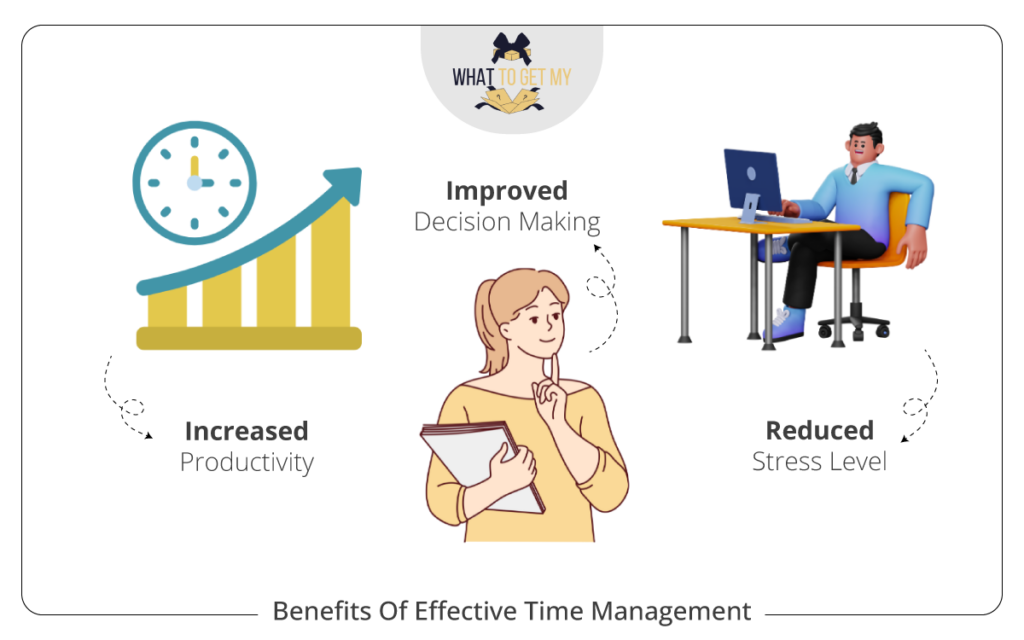
1. Increased Productivity: Effective time management allows you to prioritize tasks, work on high-value activities, and complete them efficiently. By doing so, you can significantly increase your productivity and accomplish more in less time.
2. Reduced Stress Levels: When you have a clear plan and structure in place for managing your time, it reduces stress and anxiety associated with feeling overwhelmed or disorganized. You gain a sense of control over your schedule, knowing that you have allocated time for important tasks and activities.
3. Enhanced Focus and Concentration: By managing your time effectively, you can eliminate distractions and create dedicated blocks of time for focused work. This enhances your ability to concentrate on tasks, leading to improved quality and efficiency.
4. Improved Decision Making: Effective time management allows you to allocate time for thoughtful decision-making. When you have a clear understanding of your priorities and deadlines, you can make informed choices about where to invest your time and energy.
5. Better Work-Life Balance: When you manage your time effectively, you can strike a healthier balance between work and personal life. By prioritizing and allocating time for both professional and personal activities, you can avoid burnout and enjoy a more fulfilling lifestyle.
C. What You Need to Know:
1. Effective time management techniques: Throughout this section, we will explore various effective time management techniques that can help you optimize your productivity.
2. Time management tips for productivity: In addition to discussing the benefits, we will provide practical time management tips for boosting productivity and achieving more.
3. Improve productivity with time management: Effective time management is a powerful tool that can significantly improve your productivity and overall performance.
III. Key Time Management Strategies
A. Time Management Strategies
When it comes to effective time management, employing specific strategies can make a significant difference in your ability to accomplish tasks efficiently and achieve your goals. In this section, we will explore several key time management strategies that can empower you to take control of your time and maximize productivity.
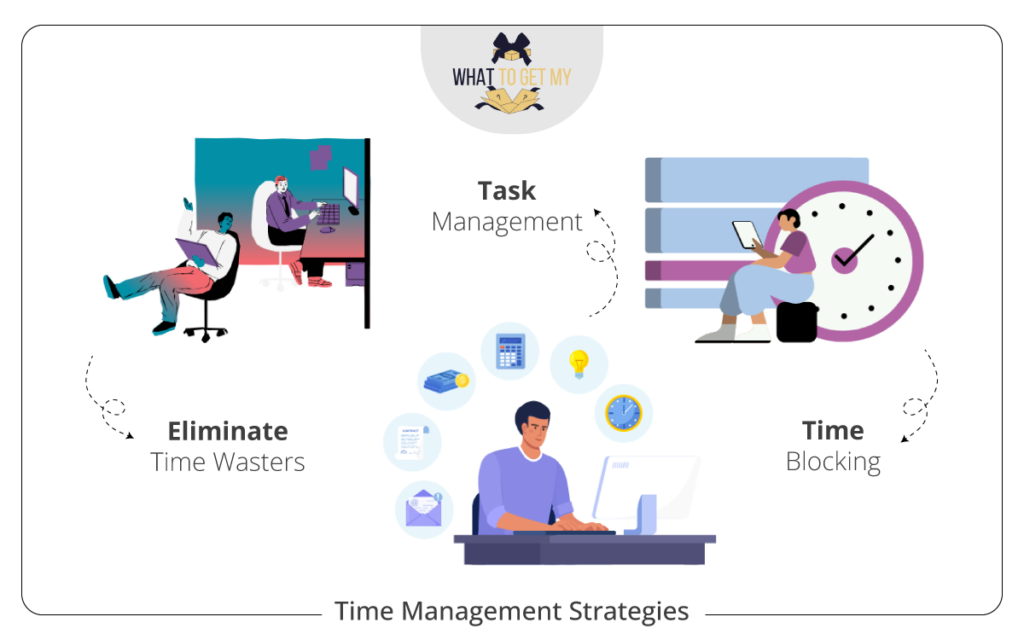
1. Prioritization and Task Management
Prioritizing tasks is a fundamental time management strategy. Start by identifying the most important and urgent tasks, and allocate dedicated time slots for them. Consider using techniques like the Eisenhower Matrix, where tasks are categorized as urgent, important, neither, or both. By focusing on important and urgent tasks first, you ensure that critical work is completed in a timely manner.
2. Time Blocking
Time blocking involves dividing your day into specific blocks of time dedicated to different activities or tasks. By scheduling blocks for focused work, meetings, breaks, and personal activities, you create a structured framework for managing your time effectively. Use calendar tools or planner apps to visually allocate time for various tasks, ensuring a balance between work and personal commitments.
3. Pomodoro Technique:
The Pomodoro Technique is a popular time management method that promotes focused work in short, concentrated bursts. Set a timer for 25 minutes (known as a Pomodoro) and work on a single task with full concentration. Take a short break of 5 minutes after each Pomodoro, and after completing a set of four Pomodoros, take a more extended break of around 15-30 minutes. This technique helps maintain focus and productivity while preventing burnout.
The graph above shows the global productivity market is expected to experience a substantial growth rate of 8.20% from 2022 to 2027, reaching a market volume of approximately US$7.22 billion by 2027 according to Statista.
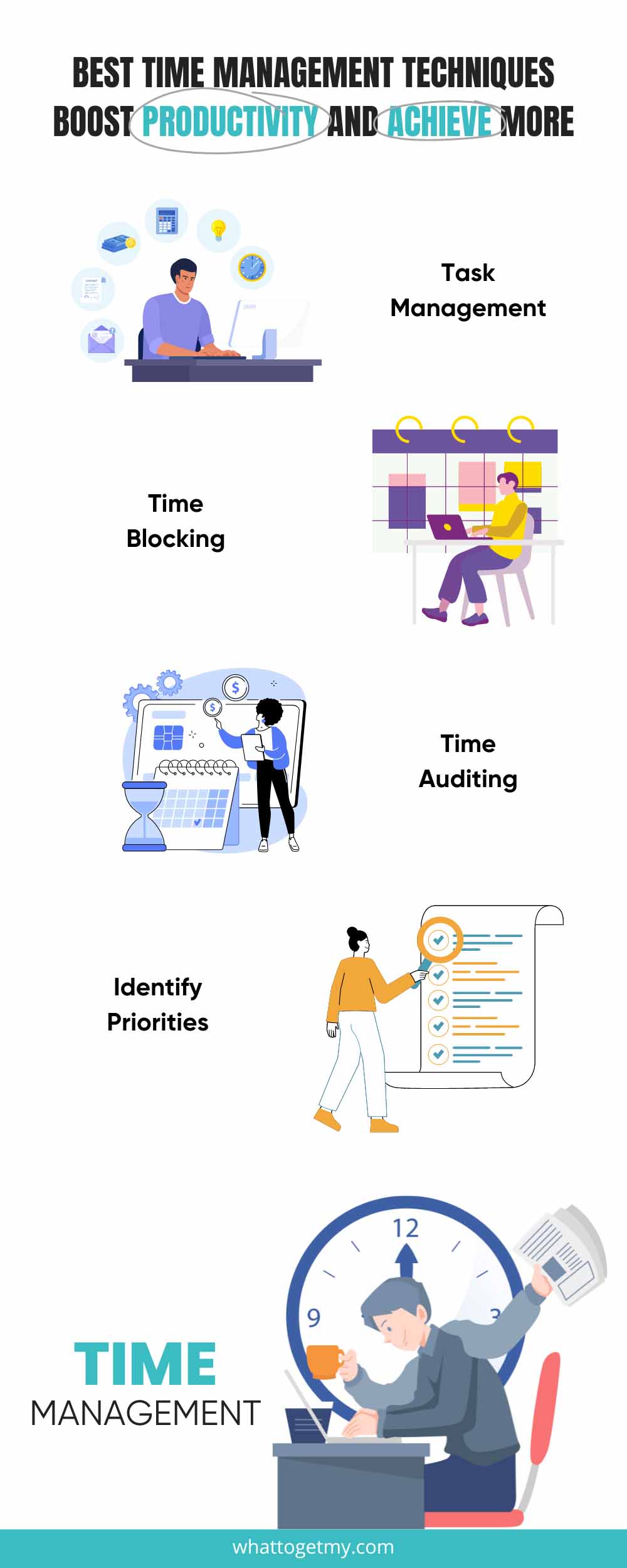
4. Eliminating Time Wasters:
Identify and eliminate time-wasting activities or distractions that hinder your productivity. Examples include excessive social media use, checking emails too frequently, or engaging in unproductive conversations. Minimizing these distractions allows you to devote more time and attention to meaningful work.
5. Delegation and Outsourcing:
Recognize tasks that can be delegated to others or outsourced to free up your time for more critical responsibilities. Effective delegation involves assessing the strengths and capabilities of your team members or seeking external assistance when needed. By leveraging the expertise of others, you can focus on higher-level tasks and projects that require your unique skills.
B. What You Need To Know
1. Time management strategies for success: These time management strategies have been proven to contribute to personal and professional success by optimizing productivity and achieving desired outcomes.
2. Boost productivity through time management: By implementing these time management strategies, you can enhance your productivity and accomplish more within the available time frame.
3. Time management techniques for achieving more: These techniques empower individuals to maximize their potential and achieve greater results through effective time management practices.
IV. Time Management Hacks and Techniques
A. Time Management Hacks and Techniques
In addition to the key strategies discussed earlier, there are numerous time management hacks and techniques that can further optimize your productivity and help you make the most of your time. These practical tips and tricks can assist you in streamlining your workflow, overcoming common challenges, and achieving better results. Let’s explore some of these time management hacks and techniques.
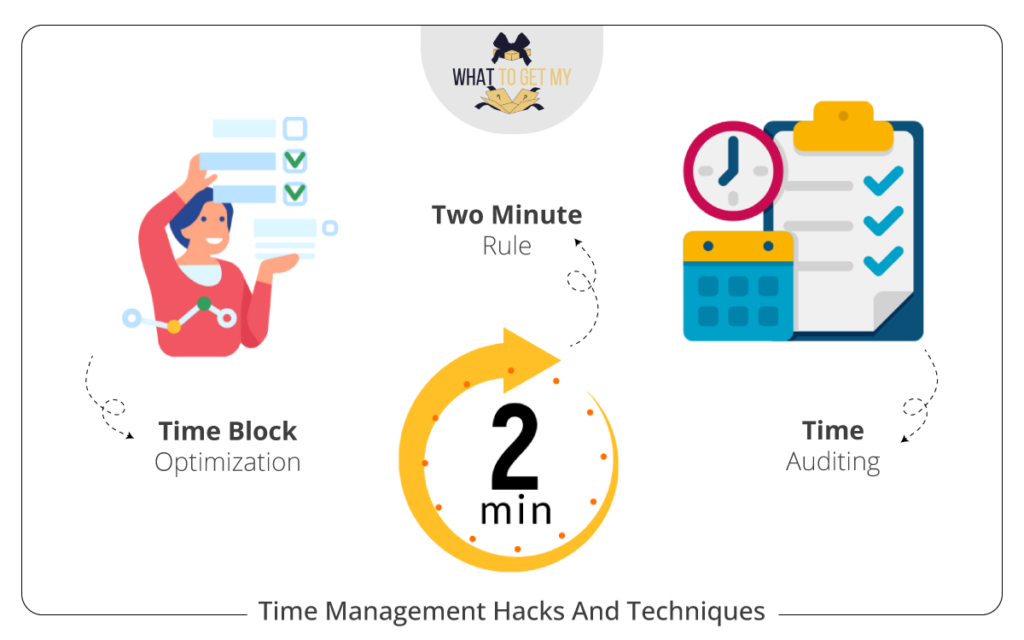
1. Time Blocking Optimization
Fine-tune your time blocking approach by grouping similar tasks together. For example, allocate a specific block of time for responding to emails, another block for focused work on a project, and a separate block for meetings. By consolidating related activities, you can minimize context switching and maintain a state of flow, thereby improving productivity.
2. The Two-Minute Rule
If a task takes less than two minutes to complete, tackle it immediately instead of adding it to your to-do list. This rule helps prevent small tasks from piling up and becoming a source of unnecessary clutter, allowing you to maintain a sense of accomplishment throughout the day.
3. The 80/20 Rule (Pareto Principle):
Apply the 80/20 rule to identify the most impactful tasks that yield the highest results. Focus on the 20% of activities that contribute to 80% of your desired outcomes. By prioritizing these high-value tasks, you can maximize your productivity and achieve significant progress towards your goals.
4. Time Auditing
Conduct regular time audits to assess how you spend your time. Keep a detailed log of your activities for a week or two, noting the time spent on each task. Analyze the data to identify patterns, time sinks, and opportunities for improvement. This insight will help you make informed decisions about how to better allocate your time in the future.
B. Step-by-Step Instructions and Tips for Implementation
To implement these time management hacks and techniques effectively, consider the following steps:
1. Identify Your Priorities
Clarify your goals and objectives, both short-term and long-term. Determine the tasks and activities that align with these priorities, ensuring that you allocate sufficient time and attention to them.
2. Assess Your Current Time Management Habits
Reflect on your current time management practices and identify areas for improvement. Recognize your strengths and weaknesses, as well as any recurring challenges that hinder your productivity.
3. Select and Adapt Time Management Hacks
Choose the time management hacks and techniques that resonate with your needs and preferences. Adapt them to suit your working style and incorporate them into your daily routine.
4. Set Clear Goals and Deadlines
Establish specific goals and deadlines for each task or project. This clarity will help you stay focused and motivated, preventing tasks from dragging on indefinitely.
5. Experiment and Refine
Implement the chosen techniques and hacks consistently, but remain open to experimentation and adjustment. Not all strategies work the same for everyone, so be willing to refine your approach based on your personal experience and feedback.
C. What You Need To Know
1. Proven time management methods: These time management hacks and techniques have been proven effective by countless individuals seeking to optimize their productivity and time utilization.
2. Time management hacks for increased productivity: Discover these practical time management hacks designed to boost productivity, allowing you to accomplish more in less time.
3. Mastering time management for success: By implementing these time management techniques and hacks, you can master the art of time management and achieve success in your personal and professional endeavors.
V. Developing Essential Time Management Skills
A. Key Skills Required for Effective Time Management
Effective time management relies on the development and mastery of specific skills that contribute to better productivity and task management. These skills play a crucial role in helping individuals effectively plan, prioritize, and utilize their time. Here are some key skills required for effective time management:
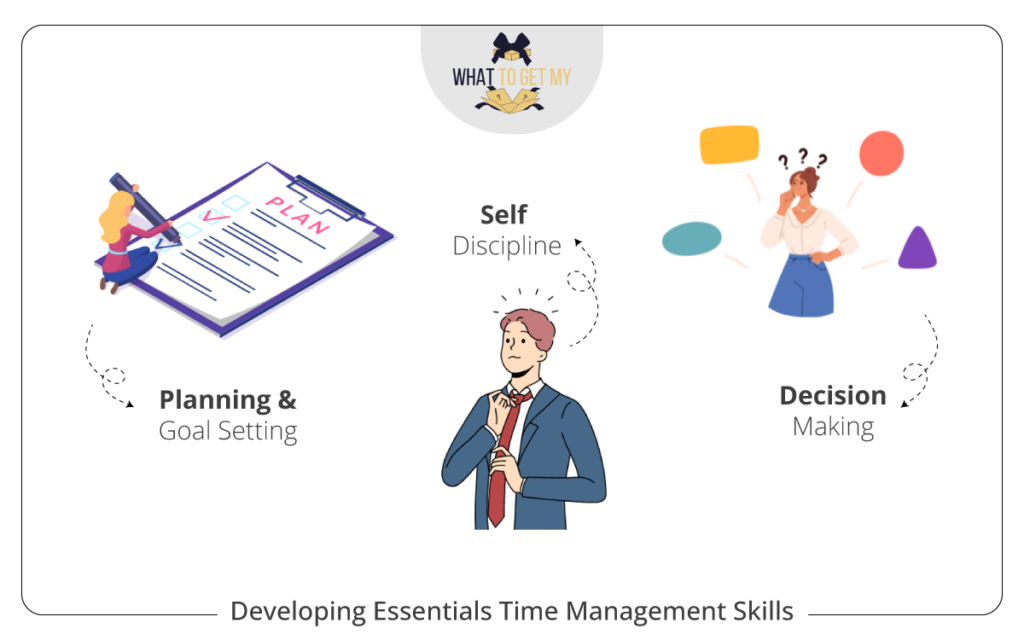
1. Organization: Being organized is essential for managing time effectively. This skill involves creating systems to categorize and store information, keeping track of deadlines, and maintaining a clutter-free workspace. Organizational skills enable individuals to locate resources quickly, stay on top of tasks, and minimize time wasted on searching for information.
2. Planning and Goal Setting: Effective time management requires the ability to set clear goals and develop actionable plans to achieve them. Goal setting helps prioritize tasks and ensures that time and effort are focused on activities that align with long-term objectives. Developing planning skills enables individuals to break down larger tasks into smaller, manageable steps and allocate time accordingly.
3. Decision Making: Efficient time management relies on making informed decisions about how to allocate time and resources. Strong decision-making skills involve assessing priorities, evaluating trade-offs, and considering the potential impact of different choices on overall productivity and goal attainment. Good decision makers can swiftly determine which tasks require immediate attention and which can be delegated or postponed.
4. Self-Discipline: Time management requires self-discipline to avoid procrastination and maintain focus on tasks. Developing self-discipline involves setting boundaries, managing distractions, and practicing self-control. By cultivating this skill, individuals can resist the temptation to engage in unproductive activities and maintain a consistent work ethic.
B. Guidance on How to Develop These Skills
To develop essential time management skills, consider the following guidance:
1. Education and Training: Seek out educational resources, books, courses, or workshops on time management. These resources can provide valuable insights and techniques for developing specific skills.
2. Practice and Consistency: Like any skill, time management skills require practice to become ingrained habits. Consistently apply time management techniques and strategies to different areas of your life, such as work, personal projects, or hobbies.
3. Reflection and Evaluation: Regularly reflect on your time management practices and evaluate their effectiveness. Identify areas for improvement and adjust your approach as needed. Learn from mistakes and successes to refine your skills over time.
4. Seek Feedback: Request feedback from trusted colleagues, friends, or mentors regarding your time management abilities. Their perspectives can offer valuable insights and suggestions for improvement.
5. Time Tracking: Utilize time tracking tools or apps to monitor how you allocate your time. Analyze the data to identify patterns, areas of improvement, and time-consuming activities that can be streamlined or eliminated.
C. What You Need To Know
Time management skills for better productivity: Developing and honing these time management skills can significantly improve your overall productivity and efficiency.
Frequently Asked Questions:
Q1: How can I overcome procrastination and improve my time management skills?
A: Overcoming procrastination requires a combination of self-awareness and practical strategies. Start by identifying the reasons behind your procrastination, whether it’s fear of failure, lack of motivation, or feeling overwhelmed. Break tasks into smaller, manageable steps and set realistic deadlines. Use techniques like the Pomodoro Technique to work in focused bursts and reward yourself after completing tasks. Additionally, eliminate distractions, create a conducive work environment, and practice self-discipline by holding yourself accountable.
Q2: What if unexpected tasks or interruptions disrupt my planned schedule?
A: It’s inevitable that unexpected tasks or interruptions will arise from time to time, but effective time management can help you handle them. Firstly, be flexible and adaptable in your approach. Evaluate the urgency and importance of the new task or interruption and adjust your schedule accordingly. Delegate tasks when possible or renegotiate deadlines if necessary. Prioritize and reschedule your existing tasks as needed, ensuring that the most critical ones are still addressed. Building buffer time into your schedule can also help accommodate unexpected events without derailing your entire day.
Q3: Are there any recommended tools or apps for time management?
A: Yes, there are numerous tools and apps available to support time management efforts. Here are a few popular options:
– Task management apps: Tools like Todoist, Trello, or Asana help you create and organize task lists, set deadlines, and track progress.
– Calendar apps: Google Calendar, Microsoft Outlook, or Apple Calendar allow you to schedule events, set reminders, and allocate time for specific activities.
– Time tracking apps: RescueTime, Toggl, or Clockify help you monitor how you spend your time, identify patterns, and assess productivity.
– Focus and productivity apps: Forest, Freedom, or StayFocusd help limit distractions by blocking certain websites or apps during specified periods, allowing you to stay focused on your tasks.
Remember to choose tools that align with your preferences and needs, and explore their features to maximize their effectiveness in supporting your time management journey.
VI. Conclusion and Final Tips
A. The Importance of Time Management Techniques
Time management techniques play a vital role in boosting productivity and achieving more in our personal and professional lives. By effectively managing our time, we can prioritize tasks, minimize distractions, and focus on activities that align with our goals. Time management empowers us to work smarter, make better decisions, reduce stress, and maintain a healthy work-life balance.
B. The Key Strategies and Techniques Discussed
Throughout this article, we have explored various strategies, hacks, and skills for effective time management. We discussed the importance of prioritization, time blocking, the Pomodoro Technique, and eliminating time wasters. We also covered skills such as organization, planning, decision making, and self-discipline, which are essential for efficient time management.
C. Additional Tips or Resources for Further Improvement
To further improve your time management skills, consider the following tips:
1. Regularly review and adjust your time management techniques based on your needs and experiences.
2. Use technology tools and apps designed for time management and productivity enhancement.
3. Develop healthy habits such as maintaining a consistent sleep schedule and incorporating regular breaks into your day.
4. Continuously seek learning opportunities, such as books, podcasts, or online courses, to expand your knowledge of time management best practices.
In conclusion, mastering time management techniques is crucial for boosting productivity and achieving more in our daily lives. By implementing effective time management strategies like prioritization, time blocking, and the Pomodoro Technique, and developing essential skills such as organization and decision making, we can optimize our use of time and accomplish our goals. Remember to apply these techniques consistently, adapt them to your unique circumstances, and continuously seek improvement.
Remember, effective time management is a lifelong journey, and with dedication and practice, you can continually refine your skills and enjoy the benefits of improved productivity and fulfillment.
02 HOURS 49 MINUTES
ESTIMATED TIME DESIGNING AND UPLOADING THIS ARTICLE
08 HOURS 10 MINUTES
ESTIMATED TIME RESEARCHING AND WRITING THIS ARTICLE
LOOKING FOR MORE GIFTS?
Try our AMAZING GIFT FINDER TOOL! Find GIFTS with 1 CLICK!
LOOKING FOR MORE GIFTS?
Try our AMAZING GIFT FINDER TOOL! Find GIFTS with 1 CLICK!
LOOKING FOR MORE GIFTS?
Try our AMAZING GIFT FINDER TOOL! Find GIFTS with 1 CLICK!
You Might Also Like

When you meet a guy with whom you have great chemistry, falling for him comes pretty easily. It’s normal to hope for a relationship with this guy because that is the normal progression of things. What happens then, when this human with an XY chromosome

How to stop husband from looking at other women. 5 effective ways.
How to stop husband from looking at other women. 5 effective ways. WhatToGetMy Instructional Article Do you feel embarrassed and insulted when your husband looks at other women in your presence? Keep scrolling to find out how to stop your husband from looking at other

Shopping for kitesurfers is not easy at all, don’t let anyone tell you otherwise. It’s not about the person but about the sport. Kitesurfing combines so many sports, from wakeboarding to skateboarding. It proves to be an extreme sport suitable only for the bravest and

3 Amazing Ideas on What to Do For a Coworker Leaving
3 Amazing Ideas on What to Do For a Coworker Leaving WhatToGetMy Instructional Article Your officemate is leaving the company, and you need to think of a creative way to wish him or her all the best. That’s not an easy task at all! How

What to Get a Dad for Christmas Who Has Everything
Christmas is around the corner and you are struggling to come up with ideas for a gift for your dad because you have no idea what to get a dad for Christmas who has everything. The holidays is the period where most dads love to

11 ILLUMINATING EXAMPLES OF BEHAVIORAL ADDICTIONS
11 ILLUMINATING EXAMPLES OF BEHAVIORAL ADDICTIONS WhatToGetMy Instructional Article Behavioral addictions, also known as non-substance addictions are addictions that do not involve the use or misuse of illicit drugs. This article will highlight some examples of behavioral addictions, how they can be identified, and how

How to Stay Single and Be Happy?
How to Stay Single and Be Happy? WhatToGetMy Instructional Article If you want to learn how to stay single and be happy, you need to change your mindset about happiness. You need to rely on yourself because happiness shouldn’t be dependent on your relationship status.

What to Do When Your Family Hates Your Boyfriend
What to Do When Your Family Hates Your Boyfriend WhatToGetMy Instructional Article There are many reasons why your family would not approve of a person you are seeing – some of these reasons might be valid, while some of them might be vain and shallow.

15 Things to Do Late at Night With Friends
15 THINGS TO DO LATE AT NIGHT WITH FRIENDS WhatToGetMy Instructional Article This article brings you 15 things to do late at night with friends. The list has been compiled to include late night activities ideas with friends that are fun and safe to do

Things to Do for 21st Birthday Without Alcohol
Things to Do for 21st Birthday Without Alcohol WhatToGetMy Instructional Article Have you ever wondered if it was possible to celebrate your 21st birthday sober, while still having fun at it and making it remarkable? Perhaps you are a guy who doesn’t drink and you’re



